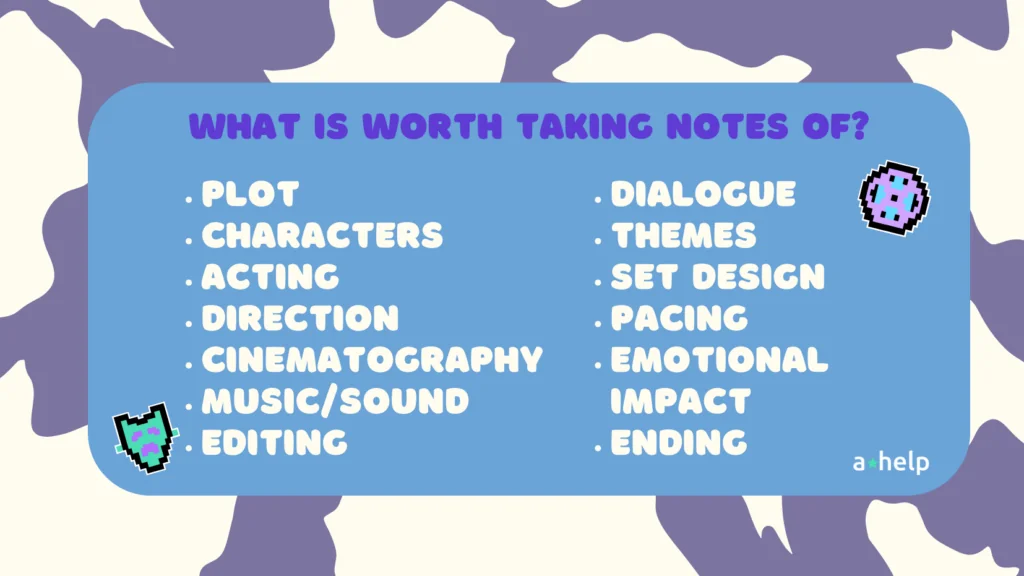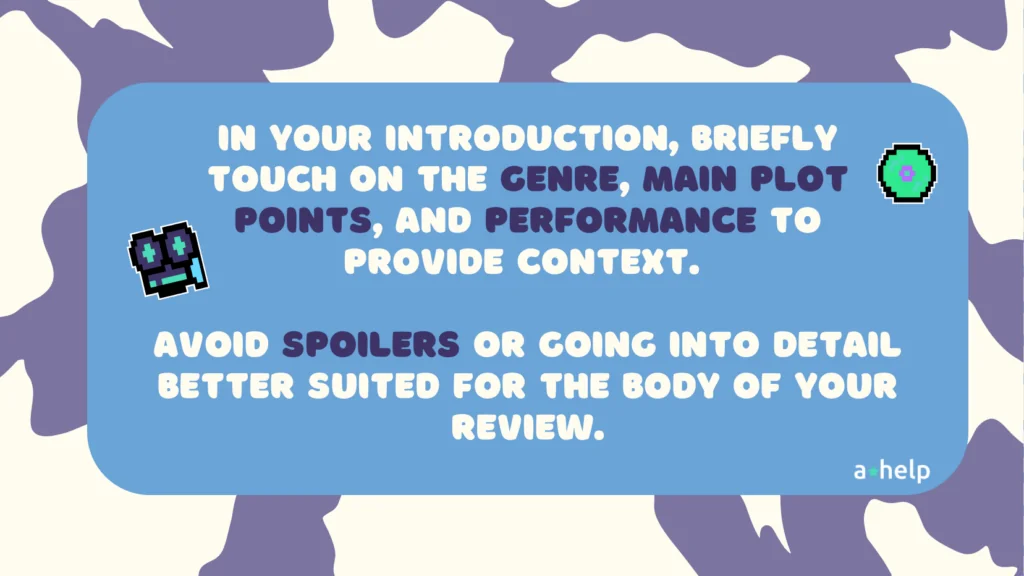Have you ever watched a film so captivating that your head starts buzzing from all the symbolism? Or, perhaps, you are filled with rage, thinking how did this even make it to the theater screens? Filmmaking is supposed to evoke emotions, whether good or bad, and there is no better way to let them out than in a movie critique. Writing a film review is no rocket science, but it takes careful preparation and in-depth research. So, buckle up, while we explain how to approach this topic and honor (or dishonor) cinematography in a proper way!

✅ AI Essay Writer ✅ AI Detector ✅ Plagchecker ✅ Paraphraser
✅ Summarizer ✅ Citation Generator
Preparation for Writing a Movie Review
Writing a movie review can be an art project in itself; it requires much more than merely watching a film. You have to keep your eyes peeled for every single detail, character, and plot twist. It can be a bit disheartening starting on your work right away since it takes planning and preparation. Let’s structure everything so that you don’t get lost.
📼 How to Choose a Movie to Review
If you weren’t tasked with a specific piece to review, choosing “the right” movie is an important process (obviously). Your film of choice is the main basis of the overall text, so you have to have a serious approach. One surefire way to choose a movie is to look for those titles that spark your attention, your interest, or films that are particularly popular or have controversial opinions on them. This is necessary due to the fact that such cases provide you with enough thematic information to bounce off of and evaluate the film. Maybe the love/hate for the film wasn’t deserved and you want to dig deeper into it? The choice is all yours. This could be a new release, a classic, or even an indie film that’s generating buzz. The main point, just like in many other types of writing, is to engage the audience and provide an in-depth analysis.
🖇 Taking Notes When Watching the Film
The process of taking notes is what will lead your narrative further. It is almost impossible to keep every single thing on your mind, especially when watching longer films for two hours or more. Not only should you pay attention to the main plotline and jot down the main elements and observations as well as extra details, but also pose questions to elaborate further in the review. Pay attention to everything that is happening: storyline, character developments, camera work, the choice of music and costume. Everything that adds to the story in your opinion should be mentioned. However, don’t waste time noting every frame, because it dilutes the main focus and can drive you away from forming a clear and concise thesis. You will thank yourself for preparing high-quality notes when starting with the actual text.
If you need further help with what to look for, here are some ideas on what you can note while watching the movie:

⏰ Watch the Film at Least Two Times
You will spend a lot of time viewing the movie and you have to deal with it sooner rather than later. There is no way a person can grasp all of the details in a single sitting. After finishing your watch the first time, you will have a much clearer idea of what is happening and how the character dynamic is changing, and you will have more capabilities to reflect on them and get to the conclusion.
Sometimes, your whole opinion of the movie can change after watching it the second time. This will make your film review much more nuanced and well-informed. Remember, that being thoroughly prepared is the only way to come up with a good opinion piece, so don’t hesitate to ‘waste’ an additional hour or two on it.
How to Write a Movie Review
Writing a film review starts with a well-thought-out outline. This structure is key to making sure you don’t miss any important parts of the film. Here’s a TLDR for you, if you need it:
- 💡 Introduction
- 🎥 Plot summary
- 👁 Analysis
- ✍️ Evaluation
Begin with the introduction, where you briefly mention the film’s title, director, release year, and genre. Share your first impression to give readers a hint of what your review will be like. For example, mentioning the unique mix of horror and comedy in a film can make readers curious about how these elements work together.
Next in your outline is the plot summary. This part is a balancing act; you want to give enough information to interest your reader without giving away the movie’s surprises. Think of it as painting a picture in broad strokes – you show the journey without detailing every twist and turn.
The analysis is where your reviews really take shape. Focus on parts that stood out to you, like exceptional performances, the director’s distinct storytelling style, or the cinematography that brought the film’s world to life. This is also where you discuss how the film affected you and why. Did it challenge your views, or did it fail to deliver its message?
Finish your outline with a section for evaluation. Reflect on the film’s strengths and weaknesses. Also, don’t forget to consider its impact and any potential significance in its genre or the director’s collection of work. This is where your perspective shines through and offers a final judgment that helps readers decide if the film is worth their time.
How to Write a Film Review Introduction
Do you want the readers to go past the first paragraph? Create an engaging introduction. It’s important to express a clear opinion right from the start, so readers know what to expect. For example, saying, “Director X’s latest film is a visual feast that reimagines the genre,” immediately reveals your positive perspective.
Stating your opinion isn’t the only way to go. Adding quotes from the director, critics, or cast can also grab attention and add depth to your review. A carefully chosen quote can shed light on the film’s creative vision or stress a key theme. For instance, “Director K said, ‘This film explores the depths of human emotion,’ which sums up the cinematic experience.”

Your introduction should also give a hint of the unique angle or perspective you’ll bring to your reviews. Whether you’re examining the film’s cultural significance, technical achievements, influence on the masses, or narrative structure, giving readers a glimpse of your approach will keep them engaged.
Keep in mind that your goals should be striking a balance between being informative and captivating. You need to encourage readers to continue with your review, and there is no better way to do so than keeping your narrative “to the point” while also showing your enthusiasm for the film.
8 Tips on How to Review a Movie
Clearly, there is no perfect answer to the question of how to write a good movie review. However, apart from all of the things mentioned above, there are some tips left that we would like to share with you. If you feel like something is still missing or you want to polish your text even more, look through the following things.
Don’t Shy Away From Criticism
A good review is more than just stating whether you liked the film; it explains why. You should really dive into your analysis, and provide thematic insights into plot inconsistencies or weak character development if you see them. The point of the review is not to sugarcoat everything, but to highlight even the messiest parts. For example, rather than simply writing that the storyline was confusing, explain which exact plot points were unclear. This way, the readers will understand your perspective much better.
Add Specific Scene Examples
Make your review more vivid by citing particular scenes that stood out. Trust us, your review will be much more relatable if you discuss a specific tense moment or a beautifully shot sequence rather than just saying “It was nerve-racking.” These examples are proof of your critiques and help readers visualize your points. For example, you might mention a scene where the cinematography captured the emotional intensity and how much the film’s visual storytelling influenced your overall impression.
Think About Your Audience
Adapt your review to fit your readers’ interests and knowledge level. If you’re writing for a general audience, focus on aspects that will resonate with a wide range of viewers, such as the plot and character arcs. For more avid fans of cinema culture, you can explore technical aspects like the director’s style or the film’s score on Rotten Tomatoes. Knowing your audience will help you find the right tone and level of detail for your review, even if it is just part of your high school assignment.
Study the People Who Made the Film
A film is a collaborative effort involving many talented individuals: actors, composers, set designers, editors, and so on. Research the backgrounds of key figures and their journey in film, because understanding their past filmmaking work and artistic styles can provide context for your review and answer some of the questions you or your readers might have. For example, knowing the director’s preference for dark, psychological thrillers might explain some creative choices in the film. This research can improve your analysis and create a more complete view of the movie.
Edit, Edit, Edit
No text will succeed in its purpose without some retouching. Revisiting your work can help spot unclear ideas and sharpen your points if you missed anything. The final step is editing, so just fix grammatical mistakes and make your language more readable. There is not much to add; don’t skip over proofreading and be your own strict editor.
Highlight the Acting
We talked about so many things in this guide but didn’t give enough attention to what is seemingly the baseline of any movie – the acting. A film’s success often hinges on its actors, and paying homage to standout performances can be a highlight in your review. Whether it’s an actor’s skill in portraying deep emotions or their interaction with fellow cast members, these details add to the appeal of the text.
Don’t Forget the Film’s Pacing
The rhythm of a film is a very interesting part of it all since it can significantly affect the viewing experience. You can elaborate on your thoughts about it in the review and discuss if the film kept a consistent pace or felt hurried in places, which was not pleasant. If you don’t know where to start, you can mention if a gradual buildup led to a more rewarding ending or if the pace felt erratic and distracted you from the story’s flow.
Still, Provide a Balanced View
Even if you consider the director your nemesis because you didn’t like the film one bit, a fair review has to present a balanced critique. It is still important to recognize its strengths and good moments. You can even provide some advice where you can. Similarly, if you absolutely loved the film, highlighting any weaknesses or areas adds credibility to your review. This balance builds trust with your readers and shows that your review is well-thought-out and not rushed.
Wrapping Up
Phew, we think that’s it! Learning how to write a movie critique takes time and, most importantly, practice. It’s okay if it doesn’t come out great the first time, you just have to keep trying. Filmmaking strings the hearts of many, and your review can be a part of that conversation. Read through the tips above, take pride in your work, and always strive for the best!
FAQ
Follow us on Reddit for more insights and updates.



Comments (0)
Welcome to A*Help comments!
We’re all about debate and discussion at A*Help.
We value the diverse opinions of users, so you may find points of view that you don’t agree with. And that’s cool. However, there are certain things we’re not OK with: attempts to manipulate our data in any way, for example, or the posting of discriminative, offensive, hateful, or disparaging material.